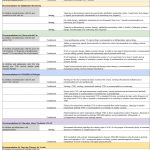(Reuters)—Jacobus Pharmaceutical Co Inc on Monday won U.S. approval for the first drug to treat children with Lambert-Eaton myasthenic syndrome, a rare autoimmune disorder. The drug, Ruzurgi (amifampridine), was approved for use in patients ages 6–17, the according to the U.S. Food and Drug Administration (FDA). Lambert-Eaton myasthenic syndrome (LEMS), which affects about three people…

New Guideline Recommends Frequent Monitoring & Collaboration for JIA-Associated Uveitis Management
As soon as pediatric patients are diagnosed with juvenile idiopathic arthritis (JIA), they should also be screened for uveitis, says ophthalmologist Gary Holland, MD. Otherwise, the University of California, Los Angeles, provider says, “Kids who are diagnosed with JIA may not come to an ophthalmologist until they have vision-limiting complications.” Uveitis is the most common…

Health Canada Approves Certolizumab Pegol & NICE Issues Guidance for Certolizumab Pegol
Certolizumab pegol has been approved in Canada for treating adults with plaque psoriasis. The U.K. has also issued its final guidance for the treatment’s use…

Summit on Connective Tissue Disease-Associated ILD Fosters Interdisciplinary Dialogue
During an international summit, physicians and researchers discussed the key clinical and research aspects of the complex intersection between connective tissue diseases and interstitial lung disease (ILD), proposing initiatives to raise awareness and conduct research to better serve patients with autoimmune forms of ILD…

Characterization of Autoreactive B Cells in Patients with SLE & RA
Antibody-secreting cells are important for the pathophysiology of SLE and RA, but researchers have been unable to determine how these cells are activated. A new technique is able to distinguish between naïve autoreactive B cells and established antibody secreting cells…
ACR Leaders to Meet with Members of Congress
On May 16, ACR and ARP leaders serving on the Board of Directors, Affiliate Society Council, Government Affairs Committee, Committee on Rheumatologic Care, RheumPAC and Insurance Subcommittee will go to Capitol Hill to advocate on behalf of the College’s membership and our patients. The group represents 31 states and the District of Columbia, and will…
ACR Issues Position Statements on Key Rheumatology Issues
The ACR recently issued three new position statements on key issues facing rheumatologists and patients with rheumatic diseases: step therapy, affordable prescription drug pricing and a special waived test designation for synovial fluid crystal analysis performed by rheumatologists. Here is a detailed look at each. Addressing Step Therapy Step therapy or fail first protocols require patients…
New RISE 2019 Dashboard Is Available!
The RISE 2019 Dashboard features an updated user experience and new functionality. We invite current RISE users to join a free webinar during the month of May to learn about these new features. Please register to join us at these any of these times: Wednesday, May 15 at noon CDT/1 p.m. EDT; Thursday, May 16 at…

A New Diagnostic Tool for Fibromyalgia?
Using vibrational spectroscopy, investigators have discovered a characteristic signature in the blood of fibromyalgia patients that is distinct from other clinical conditions, including RA, OA and SLE…
Chronic Opioid Use in Rheumatoid Arthritis: Prevalence & Predictors
Over the past decade, physicians, patients and policy makers have expressed increasing concern about the high frequency of opioids being prescribed and the association between opioid use and poor outcomes. Rates of opioid prescriptions in the general population rose considerably from the 1990s through 2010, with a plateau in the early 2010s. In 2015, 38%…
- « Previous Page
- 1
- …
- 294
- 295
- 296
- 297
- 298
- …
- 842
- Next Page »